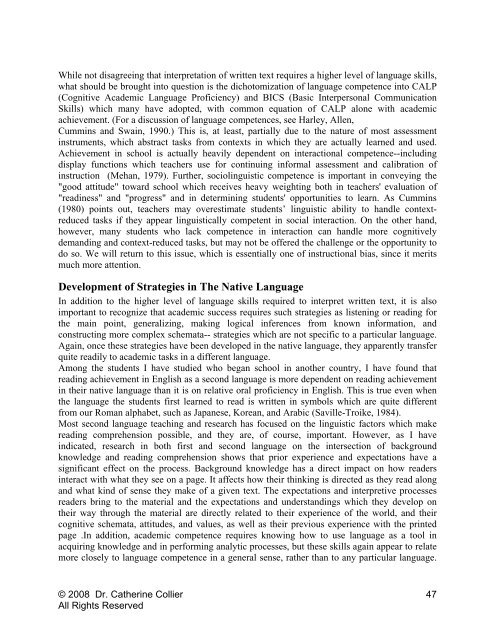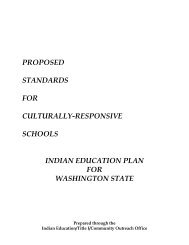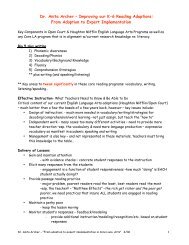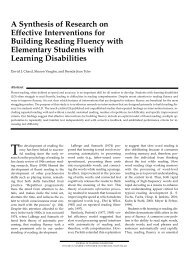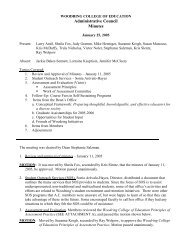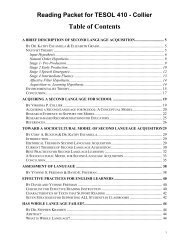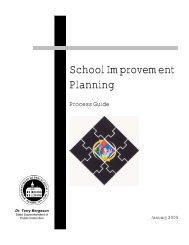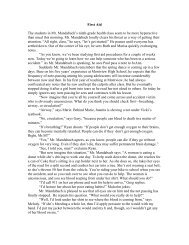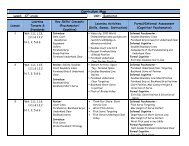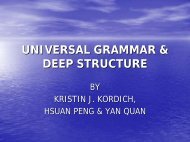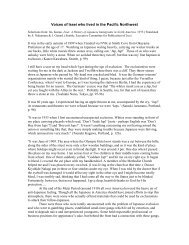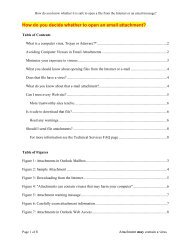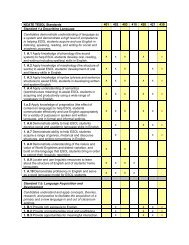understand <strong>the</strong> words o<strong>the</strong>rs are using, and it provides a meaningful context for <strong>the</strong> interpretation<strong>of</strong> new language forms.Because script knowledge is cultural knowledge, however, scripts can be expected to differaccording to social experience. Learning new scripts, or adapting preexisting ones, is thus part <strong>of</strong>acculturation or resocialization to a new group and its structure. Efforts to assess lim<strong>ited</strong> Englishspeakingstudents need to be sensitive to points where misunderstanding does occur and mayinterfere with academic performance.<strong>In</strong> <strong>the</strong> school where we conducted research, Jo Anne Kleifgen and I (Kleifgen and Saville-Troike, in press) analyzed instances <strong>of</strong> successful communication between <strong>the</strong> very lim<strong>ited</strong>English-speaking students and <strong>the</strong>ir content-area teachers in regular English-medium classroomsto find out what does work in such situations. Based on an examination <strong>of</strong> videotapes, we foundthat both students and teachers employed a general "top down" cognitive processing strategy,using <strong>the</strong>ir understanding <strong>of</strong> <strong>the</strong> larger context for <strong>the</strong> interpretation <strong>of</strong> particular events andactions. Because <strong>of</strong> similarities in prior knowledge and experience on both sides, students <strong>of</strong>tenonly needed to comprehend a single key word to interpret questions, complaints, and directives,and to make an appropriate response. From <strong>the</strong> standpoint <strong>of</strong> second language teaching, it isnoteworthy that student errors in pronunciation and grammar had only a minimal effect, if any,on <strong>the</strong>ir negotiation <strong>of</strong> meaning with teachers and English-speaking students when o<strong>the</strong>rdimensions <strong>of</strong> <strong>the</strong> situation were understood. Vocabulary knowledge, not surprisingly, was moresignificant than grammar or pronunciation. Even so, students and teachers <strong>of</strong>ten bridged lexicalgaps with nonverbal cues (pictures, gestures, and tone <strong>of</strong> voice), but interpretation again requiredembedding <strong>the</strong> interaction in known or apprehensible context.The students studied were children <strong>of</strong> foreign graduate students or visiting faculty at <strong>the</strong><strong>Un</strong>iversity <strong>of</strong> Illinois. Similar social class background, family educational level, andinternationally shared conventions <strong>of</strong> formal schooling provide <strong>the</strong> basis for commonalities inscripts between teachers and students. Thus, a relatively high level <strong>of</strong> positive transfer enablesstudents to function in a new school setting while having lim<strong>ited</strong> pr<strong>of</strong>iciency in <strong>the</strong> language <strong>of</strong>instruction--<strong>of</strong>ten more successfully, in fact, than native English-speaking students in <strong>the</strong> sameclassrooms from a less affluent and less well educated social class.<strong>In</strong>teractional CompetenceOne concept that should be questioned is <strong>the</strong> common working definition <strong>of</strong> “comprehensibleinput," which presumes that simplified sentence structure is a significant feature. Our analysis <strong>of</strong>classroom interaction demonstr<strong>ates</strong> that background knowledge is crucial to interpretation <strong>of</strong>meaning when knowledge <strong>of</strong> language forms is lim<strong>ited</strong>, but sentence complexity does not seemto make much difference. Even in <strong>the</strong> context-reduced processing <strong>of</strong> written text, Floyd andCarrell (1987) have shown that providing ESL students with supplementary backgroundinformation significantly improves reading comprehension, while simplifying <strong>the</strong> syntacticstructure has no significant effect. First language readability studies yield similar conclusions: infact, simplifying sentence structure <strong>of</strong>ten makes a text more difficult for native speakers toprocess since it reduces redundancy. While students can <strong>of</strong>ten negotiate meaning in face-to-faceinteraction even with extremely lim<strong>ited</strong> linguistic skills, because <strong>of</strong> <strong>the</strong> familiarity or redundancy<strong>of</strong> <strong>the</strong> extra linguistic context in which it is situated, <strong>the</strong>ir attainment <strong>of</strong> a high level <strong>of</strong> academiccompetence requires <strong>the</strong> ability to decode and encode meaning in context-reduced tasks, such asreading and writing. (Cummins [1980, 1981, 1984] has written extensively on this point,particularly with respect to <strong>the</strong> different requirements placed on linguistic competence.)© 2008 Dr. Ca<strong>the</strong>rine CollierAll Rights Reserved46
While not disagreeing that interpretation <strong>of</strong> written text requires a higher level <strong>of</strong> language skills,what should be brought into question is <strong>the</strong> dichotomization <strong>of</strong> language competence into CALP(Cognitive Academic Language Pr<strong>of</strong>iciency) and BICS (Basic <strong>In</strong>terpersonal CommunicationSkills) which many have adopted, with common equation <strong>of</strong> CALP alone with academicachievement. (For a discussion <strong>of</strong> language competences, see Harley, Allen,Cummins and Swain, 1990.) This is, at least, partially due to <strong>the</strong> nature <strong>of</strong> most assessmentinstruments, which abstract tasks from contexts in which <strong>the</strong>y are actually learned and used.Achievement in school is actually heavily dependent on interactional competence--includingdisplay functions which teachers use for continuing informal assessment and calibration <strong>of</strong>instruction (Mehan, 1979). Fur<strong>the</strong>r, sociolinguistic competence is important in conveying <strong>the</strong>"good attitude" toward school which receives heavy weighting both in teachers' evaluation <strong>of</strong>"readiness" and "progress" and in determining students' opportunities to learn. As Cummins(1980) points out, teachers may overestimate students’ linguistic ability to handle contextreducedtasks if <strong>the</strong>y appear linguistically competent in social interaction. On <strong>the</strong> o<strong>the</strong>r hand,however, many students who lack competence in interaction can handle more cognitivelydemanding and context-reduced tasks, but may not be <strong>of</strong>fered <strong>the</strong> challenge or <strong>the</strong> opportunity todo so. We will return to this issue, which is essentially one <strong>of</strong> instructional bias, since it meritsmuch more attention.Development <strong>of</strong> Strategies in The Native Language<strong>In</strong> addition to <strong>the</strong> higher level <strong>of</strong> language skills required to interpret written text, it is alsoimportant to recognize that academic success requires such strategies as listening or reading for<strong>the</strong> main point, generalizing, making logical inferences from known information, andconstructing more complex schemata-- strategies which are not specific to a particular language.Again, once <strong>the</strong>se strategies have been developed in <strong>the</strong> native language, <strong>the</strong>y apparently transferquite readily to academic tasks in a different language.Among <strong>the</strong> students I have studied who began school in ano<strong>the</strong>r country, I have found thatreading achievement in English as a second language is more dependent on reading achievementin <strong>the</strong>ir native language than it is on relative oral pr<strong>of</strong>iciency in English. This is true even when<strong>the</strong> language <strong>the</strong> students first learned to read is written in symbols which are quite differentfrom our Roman alphabet, such as Japanese, Korean, and Arabic (Saville-Troike, 1984).Most second language teaching and research has focused on <strong>the</strong> linguistic factors which makereading comprehension possible, and <strong>the</strong>y are, <strong>of</strong> course, important. However, as I haveindicated, research in both first and second language on <strong>the</strong> intersection <strong>of</strong> backgroundknowledge and reading comprehension shows that prior experience and expectations have asignificant effect on <strong>the</strong> process. Background knowledge has a direct impact on how readersinteract with what <strong>the</strong>y see on a page. It affects how <strong>the</strong>ir thinking is directed as <strong>the</strong>y read alongand what kind <strong>of</strong> sense <strong>the</strong>y make <strong>of</strong> a given text. The expectations and interpretive processesreaders bring to <strong>the</strong> material and <strong>the</strong> expectations and understandings which <strong>the</strong>y develop on<strong>the</strong>ir way through <strong>the</strong> material are directly related to <strong>the</strong>ir experience <strong>of</strong> <strong>the</strong> world, and <strong>the</strong>ircognitive schemata, attitudes, and values, as well as <strong>the</strong>ir previous experience with <strong>the</strong> printedpage .<strong>In</strong> addition, academic competence requires knowing how to use language as a tool inacquiring knowledge and in performing analytic processes, but <strong>the</strong>se skills again appear to relatemore closely to language competence in a general sense, ra<strong>the</strong>r than to any particular language.© 2008 Dr. Ca<strong>the</strong>rine CollierAll Rights Reserved47
- Page 2 and 3: "Those who arrive by age 12 or 13 m
- Page 5: Article I.2 Are Signed Languages "R
- Page 8 and 9: Biological analyses of the status o
- Page 10 and 11: and beyond, speaking and signing ch
- Page 12 and 13: Conclusion: Are Signed Languages Re
- Page 14 and 15: Article I.3 The Interpreter: Has a
- Page 16 and 17: A few weeks earlier, I had called F
- Page 18 and 19: “We struggled even getting to the
- Page 20 and 21: herself by strapping a cassette rec
- Page 22 and 23: In 1998, after nine years as the ch
- Page 24 and 25: momentary burst of excitement that
- Page 26 and 27: can shape core grammar. Because the
- Page 28 and 29: The authors compared animal and hum
- Page 30 and 31: monkey moved. He followed it with h
- Page 32 and 33: delight, fear, laughter, and surpri
- Page 34 and 35: Piipaío in a hut: Pirahã huts typ
- Page 36 and 37: LEP students, and equitable organiz
- Page 38 and 39: 4. Second language development crea
- Page 41 and 42: curriculum or "teaching to the test
- Page 43 and 44: portfolio work was scanned and stor
- Page 45: experiences of many groups of stude
- Page 49 and 50: sound educational practice, however
- Page 51 and 52: arises from the efforts to abstract
- Page 53 and 54: Article II.2 Cross-Cultural Communi
- Page 55 and 56: males who can serve as positive rol
- Page 57 and 58: Understanding another culture is a
- Page 59 and 60: Pets and AnimalsWhich animals are v
- Page 61 and 62: to teach standard English is reflec
- Page 63 and 64: Asking personal questions of a pers
- Page 65 and 66: Using Cross Cultural Communication
- Page 67 and 68: Why Do Nonstandard English-Speaking
- Page 69 and 70: Before beginning to teach standard
- Page 71 and 72: • Negative attitudes toward low p
- Page 73 and 74: New standardized tests and assessme
- Page 75 and 76: Each of the behaviors listed above
- Page 77 and 78: Article II.3 Hard Work Hypothesis:
- Page 79 and 80: each point higher in SES, students
- Page 81 and 82: This case does not provide strong s
- Page 83 and 84: Article II.4 Language Acquisition a
- Page 85 and 86: 1992, p. XI). These researchers, wh
- Page 87 and 88: comprehend a word within a specific
- Page 89 and 90: more to the truthfulness of the chi
- Page 91 and 92: This idea of “semilingualism” c
- Page 93 and 94: Article III.1 A Brief Description o
- Page 95 and 96: take different lengths of time to c
- Page 97 and 98:
example, should involve the same co
- Page 99 and 100:
As with all stages of BICS acquisit
- Page 101 and 102:
Assessment techniques at stage 3 ca
- Page 103 and 104:
different. Therefore, the social di
- Page 105:
integrative motivation. Basically,
- Page 109 and 110:
(Ellis, 1985; Hakuta, 1986). Howeve
- Page 111 and 112:
that sociocultural processes have o
- Page 113 and 114:
Article III.3 How Children Acquire
- Page 115 and 116:
phonetic units (unique to signed la
- Page 117 and 118:
Article III.4 Toward a Sociocultura
- Page 119 and 120:
emember is that the fundamental goa
- Page 121 and 122:
The best practices models can be th
- Page 123 and 124:
By focusing on the dialectic betwee
- Page 125 and 126:
intergenerational wisdom shared by
- Page 127 and 128:
Daily Realities RecappedThe above v
- Page 129 and 130:
traditions. At a time in our histor
- Page 131 and 132:
We will now look at two examples of
- Page 133 and 134:
Speakers communicate fluently, main
- Page 135 and 136:
question the effects of such attitu
- Page 137 and 138:
Article IV.3 Culture Change: Effect
- Page 139 and 140:
and psychological characteristics o
- Page 141 and 142:
Contraryto what wewere expecting, t
- Page 143 and 144:
Article V.1 Assessment in ESL & Bil
- Page 145 and 146:
vocabulary does the student lack?Is
- Page 147 and 148:
whether they are LEP and to provide
- Page 149 and 150:
Fourth, ESL and bilingual program s
- Page 151 and 152:
competent reader/writer. All versio
- Page 153 and 154:
Table 1Comparison of Recent Accultu
- Page 155 and 156:
unilinear model, which measures the
- Page 157 and 158:
an English-only instructional progr
- Page 159 and 160:
Article V.3 Assessment of English L
- Page 161 and 162:
8. Change answers only for a very g
- Page 163 and 164:
Riles, 1979; Jose P. v Ambac, 1983)
- Page 165 and 166:
proficiency is often underestimated
- Page 167 and 168:
Finally, when second language reade
- Page 169 and 170:
for their decisions, noting issues
- Page 171 and 172:
As mentioned above, when the transi
- Page 173 and 174:
ather than generic adjectives and t
- Page 175 and 176:
their imagined points of view. Ther
- Page 177 and 178:
English texts and demonstrate progr
- Page 179:
using inter-district teams). In the


